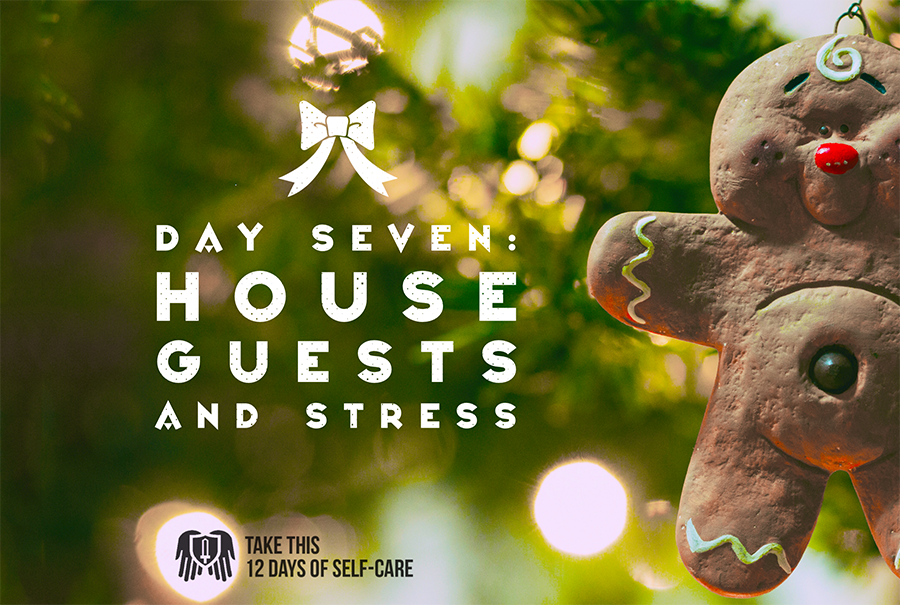
On the seventh day of our 12 Days of Self-Care series, Patrick Wall offers some techniques for co-existing with house guests (especially when you’re nearing the end of your patience). For more helpful tips on coping with common stresses of the holiday season and the transition into the new year, check back every day.
The holidays are well and truly upon us, and while they may be full of cheer and eggnog (if you enjoy that sort of thing), they can also be full of stress. The holidays disrupt our regular schedules and can temporarily change what’s normal and expected for us. Some of us get time off for the holidays and have our routines replaced with chaos. Some of us still have to work on top of all the chaos. This goes beyond ourselves–others get stressed too.
You might have to share your own space with family and friends coming to visit. Or you might be the visitor. Either way, it can be stressful, but by managing that stress and approaching each other from a place of empathy, we can be understanding and forgiving of all involved. That’s the key to keeping our relationships strong while taking care of ourselves.
Here are some general tips that may be helpful for your individual situation:
- Keep or make a schedule: People tend to feel less stressed when they know what the plan is. It may be beneficial to make a schedule for the day, especially if your regular schedule is gone. This may help prepare yourself for the day to come. If you’re able to keep a modified version of your regular schedule, that may help too.
- Remember to take time for yourself: It can be hard to practice self-care, especially when family or friends are staying over. It can feel like it’s important to put their needs above your own and entertain at all times. Remembering to schedule some time for yourself and to step away from the chaos can be helpful. This may be in the morning before others wake up or in the evening when your home is settling down. Taking a short break in the middle of the day when it feels especially chaotic can be good, too. It might feel difficult to communicate that you even need a break, but it’s often worthwhile, which leads us to our next point…
- Tell others what you need: It may be helpful to let your guests know that you’ll be unavailable to entertain or spend time with them for a while during the day, or that you plan on going to bed early. This lets them know what to expect, and gives them a chance to plan how to spend their time. We can waste energy and add to our own worries when some communication would help resolve the issue. Communicating with your guests may also ease their stress as well. You may even be able to delegate some tasks you don’t have time for to helpful friends and family.
- Forgive your own missteps: if you get cranky or forget to buy enough –insert favored holiday treat here- from the grocery store, that’s okay. If you fall behind in your schedule or your plan, recognize that unlike Santa Claus, you are not magical and capable of doing everything for everyone. And that is completely okay and normal.
If all else fails, remember that the holidays end. If you find the holidays extra stressful, they’ll be over soon. Your “regular” day will be the norm again in no time.
With as busy as the holidays can be it can feel like it isn’t worth it or even possible to practice self-care. If we take some time to work on self-care, however, we can add to the pool of resources that allows us to handle the unique challenges of the holidays.
Patrick Wall is a nationally certified school psychologist by day and a sleepy person by night. He also plays music, writes, and has many of those things people call “hobbies.”
This article is not a substitute for medical advice or professional counseling. While we at Take This want to provide you with resources, we do not recommend or endorse any particular site, treatment, therapy, or resource. We provide these links at our sole discretion but have not necessarily vetted or reviewed any particular resource. We assume no liability for the use of the information or resources on these sites and encourage you to use your own best judgment when reviewing these resources.
If you live in the US and you’re having suicidal thoughts, reach out to the Suicide & Crisis Lifeline or call/text 988. If you’re outside the US, you can find local crisis lines at Suicide.org. If you’re even debating whether you should call them, you should call them. The Suicide & Crisis Lifeline handles all psychological crises, not just suicide.
